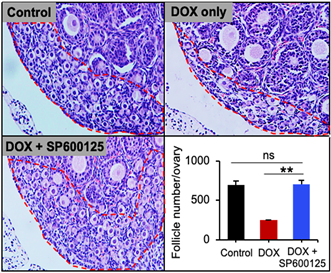
JNK Inhibitor SP600125 prevented DOX-induced Primordial Follicle Loss
Invention Summary:
Premature ovarian failure (POF) is a disease characterized by the depletion of primordial follicles in women’s ovaries before the age of 40, and is a major side effect of chemotherapy in childhood-age, adolescent and young adult female cancer patients. POF can cause early menopause, infertility, as well as multiple ovarian endocrine disorders. There is a need for treating, ameliorating, and/or preventing follicle loss and/or POF in the young female cancer patients.
Rutgers researchers have discovered that doxorubicin (DOX) and cisplatin, common chemotherapeutic drugs for numerous cancers, can selectively active c-Jun N-terminal kinase (JNK) in the oocytes of primordial follicles, thereby triggering primordial follicle death and leading to POF. The researchers have also discovered that a specific JNK inhibitor, SP600125, effectively prevented POF induced by DOX and cisplatin.
The results have been demonstrated in in vivo and in vitro mouse ovarian tissue culture models, and shown that, during cancer therapy, the pharmacological inhibition of JNK has a great potential to prevent chemotherapy-induced POF in young female cancer patients.
Advantages:
- A treatment directly targeting the DNA damage leading to ovarian oocyte death and POF that results from chemotherapy
- Allow patients to maintain their own ovaries and associated ovarian endocrine functions rather than surgical removal and storage of the ovaries for future use
Market Applications:
- A drug to be used as a cancer supportive care drug for young female cancer patients undergoing chemotherapy to protect their ovarian function and fertility
Intellectual Property & Development Status:
Patent pending. Available for licensing and/or research collaboration.